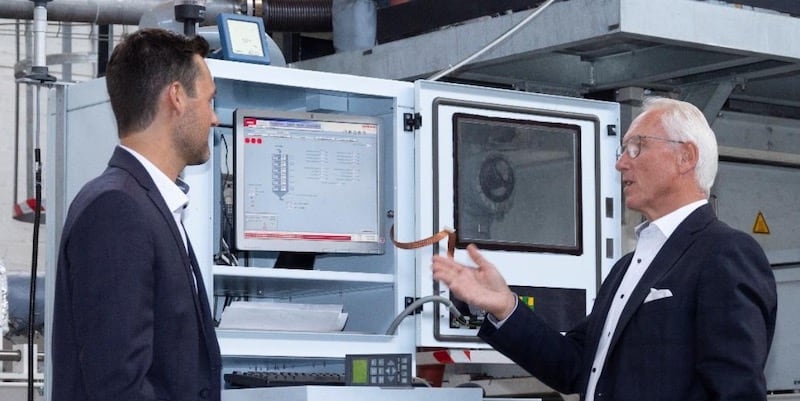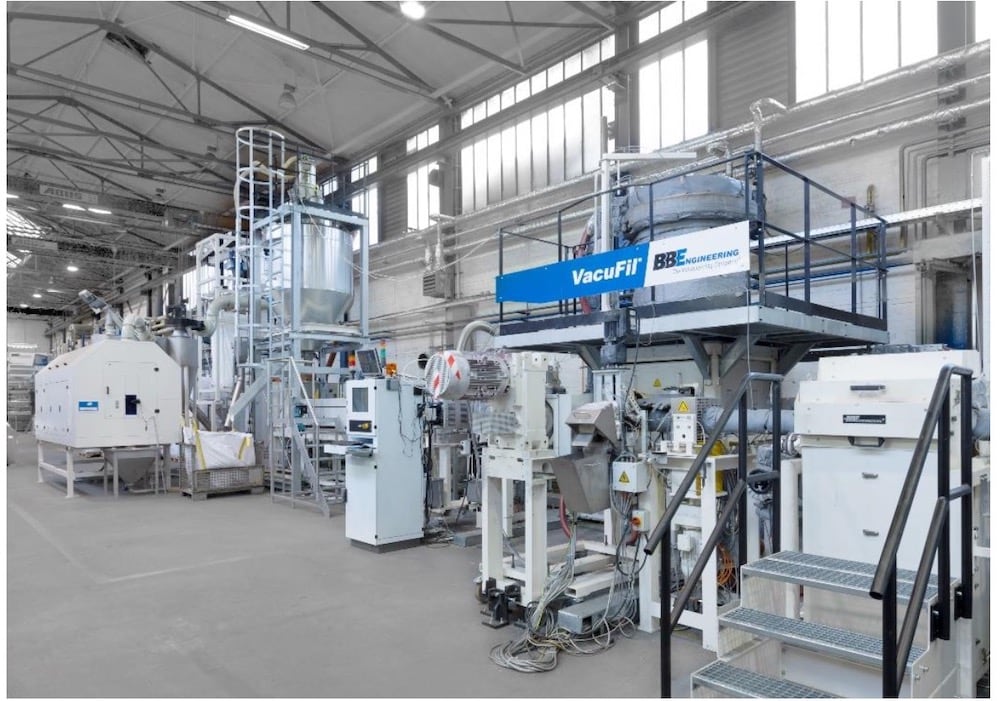As a medium-sized German machine construction business, BB Engineering has been manufacturing components and systems for synthetic fiber and film production for more than 20 years.
For several years now, the company has been concentrating on recycling system development work.
We discussed just how the seemingly different business units interact and how the recycling business profits from the existing extrusion and spinning systems know-how with Dr Klaus Schäfer, Managing Director, and Mr Matthias Schmitz, Head of Engineering Recycling Technology.
- Dr Schäfer, BB Engineering has its origins in the manufacture of extrusion and filtration systems for synthetic fiber spinning equipment. How did you come to open a new business unit dedicated to PET recycling?
You are fundamentally right. Our original business was, and remains, focused on components such as extruders and filters for processing the most diverse polymers into synthetic fibers, but also into films and on developing and distributing other products.
Soon, our portfolio was complemented by our own compact spinning system – in the form of the VarioFil. Our extruder and filters have also been used for rPET for many years now. We first supplied components for rPET back in 2005.
For these reasons, PET recycling was not something completely new to us. In 2012, we unveiled the VarioFil type ‘R’, which also spins rPET granulate into high-end yarn. And, in 2016, we went a step further with the type ‘R+’: the direct processing of bottle flakes using our compact spinning system – in other words, recycling and spinning in a single step. The background to this was to dispense with the intermediate step of producing the granulate, hence saving lots of energy and cutting conversion costs, and to create high-quality POY from bottle flakes.

- What potential benefits do you see in the recycling of synthetic fibers?
Apart from the social responsibility of acting in a resource- and environmentally-friendly manner, we believe that recycling fibers presents our customers with considerable commercial opportunities. Firstly, there is production waste.
Despite spinning technology becoming ever better, there is always waste in the form of B-quality goods, caused by over-production and during start-up and retooling. Instead of simply disposing of this – in view of constantly rising prices for raw materials and decreasing availability – nevertheless valuable material, it is far more economical to process it and return it to the production process. Yarn manufacturers can not only cut costs, they also become more autonomous.
Furthermore, general developments, such as increasing population densities and fast fashion, are creating ever greater demand for polyester and polyester fibers. Here, many major textiles manufacturers have set themselves ambitious targets with regards to the utilization of recycled fibers. So, you can now see that the potential benefits of fiber recycling are tremendous.
- So, VarioFil R/R+ was a huge milestone for BB Engineering. You are now expanding your portfolio with VacuFil. What exactly is the VacuFil and how does this system differ from the VarioFil R/R+?
The starting point for the VacuFil was the aim of offering our clientèle a zero-waste spinning system with which they can reutilize their own production waste. Very much in line with the circular economy. The VacuFil recycles this waste.
The VarioFil then spins the processed material. Whereby the VacuFil stands on its own, of course, and can also be combined with a granulation process and other further processing procedures. Equally, starting materials other than spinning waste can be processed as well – such as bottle waste, trays, films, etc.
On the one hand, these of course have completely different properties and, on the other hand, the requirements of the subsequent recycled material also vary depending on the end-use. To ensure the VacuFil is able to fulfill such changing recycling tasks in a reliable and reproducible manner, the flexible controlling of the intrinsic viscosity was the top priority during development.

- Where do you acquire your know-how? Processing virgin material into films and filaments and recycling polyester are actually two completely different processes.
Of course, these are two completely different processes, but we view the necessary conversion into recycled material from the perspective of the end product. The desired properties of the end product determine the requisite quality of the starting material and hence also the requirements for the recycled materials and their production. We come full circle. Hence, we know precisely what is important when recycling PET to ensure that further processors are able to use it to create high-quality products.
- In theory, that sounds very promising. What does the performance look like in practice?
Our trials have shown that – in the right configuration – our high-end extrusion and, above all, our filtration technologies are able to produce high-end rPET granulate for high-quality POY or FDY. Our system creates an intrinsic-viscosity build-up of up to 0.15 dl/g and homogeneity fluctuations of just ± 0.01 dl/g. We have achieved outstanding results in our tests. In part, the recycled materials from our VacuFil systems even offer superior spinning properties compared to the virgin material used in the tests – particularly with regards to spinning breaks and lint formation. We offer our test system to customers and other interested parties for specific material and process tests.
These are surprisingly positive results, considering you normally have to accept compromises when using recycled materials. How have you achieved this? What is so special about the VacuFil process?
Fundamentally, we use liquid-state polycondensation, which cleans more effectively than solid-state polycondensation processes. But the truly special feature with the VacuFil is, above all, our Visco+ component. With this, we have developed a unique vacuum filter system for viscosity build-up and viscosity homogenization. We currently have a patent-pending here. Add to this the interaction with high-end extrusion, large-area filtration and excellent degasification technology.
The right configuration of these units is absolutely decisive. We are proud that we have succeeded here, drawing on our many years of extrusion and filtration expertise.
- Mr Schmitz, you mentioned that the VacuFil is compatible with various further processing procedures. What possibilities do manufacturers actually have?
You can combine the VacuFil with various pelleting units. However, you can also feed the recycled melt from the Vacu- Fil directly into the further processing systems, regardless of whether these are spinning systems, film production units or other manufacturing processes. There are many possible options.
BB Engineering also offers several optional add-ons for the VacuFil. For example, our 3DD mixing system, which enables the recycled material to be returned to the virgin polymer flow in a polycondensation system. This mixing system can also be used to add additives, masterbatches and similar to the rPET melt. Overall, the VacuFil is extremely modular and flexible.
About BB Engineering
BB Engineering GmbH is a German machine building company founded in 1997 as a joint venture between Oerlikon Barmag, a subsidiary of Oerlikon Textile GmbH & Co. KG, and Brückner Group GmbH. Today, the company employs more than 160 members of staff at its location in Remscheid, Germany, focusing their business on the development, engineering, design and manufacturing of extrusion and filtration technologies as well as complete spinning lines (VarioFil) and recycling technologies (VacuFil, Visco+) for the plastics and textiles industry. The services offered range from the design and planning phases all the way through to the implementation of projects.































